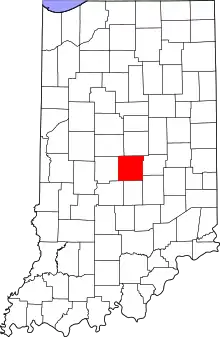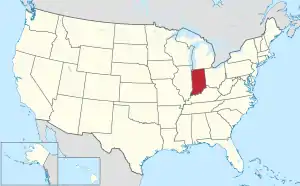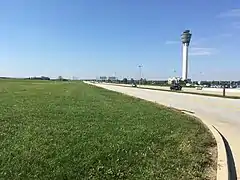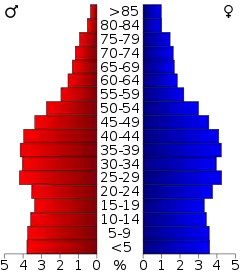Marion County, Indiana
Marion County is located in the U.S. state of Indiana. The 2020 United States census reported a population of 977,203,[1] making it the largest county in the state and 51st most populated county in the country. Indianapolis is the county seat, the state capital, and largest city.[2] Marion County is consolidated with Indianapolis through an arrangement known as Unigov.
Marion County | |
|---|---|
_exterior.jpg.webp) | |
 Location within the U.S. state of Indiana | |
 Indiana's location within the U.S. | |
| Coordinates: 39°47′N 86°08′W | |
| Country | |
| State | |
| Founded | April 1, 1822 |
| Named for | Francis Marion |
| Seat | Indianapolis |
| Largest city | Indianapolis |
| Area | |
| • Total | 403.01 sq mi (1,043.8 km2) |
| • Land | 396.30 sq mi (1,026.4 km2) |
| • Water | 6.71 sq mi (17.4 km2) |
| Population (2020) | |
| • Total | 977,203 |
| • Density | 2,466/sq mi (952/km2) |
| Time zone | UTC−5 (Eastern) |
| • Summer (DST) | UTC−4 (EDT) |
| Congressional districts | 6th, 7th |
| Website | www |
| |
Marion County is the central county of the Indianapolis–Carmel–Anderson MSA in Central Indiana.
Geography
The low rolling hills of Marion County have been cleared of trees, and the area is completely devoted to municipal development or to agriculture, except for wooded drainages.[3] The highest point (920 feet/280 meters ASL) is a small ridge at the county's northwest corner.[4]
According to the 2010 census, the county has an area of 403.01 square miles (1,043.8 km2), of which 396.30 square miles (1,026.4 km2) (or 98.34%) is land and 6.71 square miles (17.4 km2) (or 1.66%) is water.[5]
The White River flows southwestward through the central part of the county; it is joined by Eagle Creek and Fall Creek, both of which have dams in the county forming Eagle Creek Reservoir and Geist Reservoir, respectively.
Marion County has two Indiana State Parks, Fort Harrison State Park and White River State Park, as well as many municipal parks.
Adjacent counties
- Hamilton County - north
- Hancock County - east
- Shelby County - southeast
- Johnson County - south
- Morgan County - southwest
- Hendricks County - west
- Boone County - northwest
Transportation
Major highways
* I-69 currently ends in Indianapolis at the I-465 interchange in the northeast section of the county. The extension connecting Indianapolis and Evansville is expected to be completed in 2024.
Transit
- IndyGo Red Line
- Indianapolis Union Station
- Amtrak Cardinal
- Barons Bus Lines
- Burlington Trailways
- Flixbus
- Greyhound Lines
- Miller Transportation
Airports

- KIND - Indianapolis International Airport
- KEYE - Eagle Creek Airpark[6]
- Post-Air Airport[7]
History
Marion County was created on April 1, 1822, from part of the "New Purchase" lands that had been obtained from its inhabitants, the Lenape, by the Treaty of St. Mary's.[8] It is named for Francis Marion, a brigadier general from South Carolina in the American Revolutionary War.[9]
The state capital was moved to Indianapolis in Marion County from Corydon on January 10, 1825. This began a period of rapid growth in population.[10]
Climate and weather
| Indianapolis, Indiana | ||||||||||||||||||||||||||||||||||||||||||||||||||||||||||||
|---|---|---|---|---|---|---|---|---|---|---|---|---|---|---|---|---|---|---|---|---|---|---|---|---|---|---|---|---|---|---|---|---|---|---|---|---|---|---|---|---|---|---|---|---|---|---|---|---|---|---|---|---|---|---|---|---|---|---|---|---|
| Climate chart (explanation) | ||||||||||||||||||||||||||||||||||||||||||||||||||||||||||||
| ||||||||||||||||||||||||||||||||||||||||||||||||||||||||||||
| ||||||||||||||||||||||||||||||||||||||||||||||||||||||||||||
In recent years, average temperatures in Indianapolis have ranged from a low of 20 °F (−7 °C) in January to a high of 86 °F (30 °C) in July, although a record low of −22 °F (−30 °C) was recorded in January 1985 and a record high of 104 °F (40 °C) was recorded in June 1988. Average monthly precipitation ranged from 2.05 inches (52 mm) in January to 4.78 inches (121 mm) in July.[11]
Demographics

| Census | Pop. | Note | %± |
|---|---|---|---|
| 1830 | 7,192 | — | |
| 1840 | 16,080 | 123.6% | |
| 1850 | 24,103 | 49.9% | |
| 1860 | 39,855 | 65.4% | |
| 1870 | 71,939 | 80.5% | |
| 1880 | 102,782 | 42.9% | |
| 1890 | 141,156 | 37.3% | |
| 1900 | 197,227 | 39.7% | |
| 1910 | 263,661 | 33.7% | |
| 1920 | 348,061 | 32.0% | |
| 1930 | 422,666 | 21.4% | |
| 1940 | 460,926 | 9.1% | |
| 1950 | 551,777 | 19.7% | |
| 1960 | 697,567 | 26.4% | |
| 1970 | 792,299 | 13.6% | |
| 1980 | 765,233 | −3.4% | |
| 1990 | 797,159 | 4.2% | |
| 2000 | 860,454 | 7.9% | |
| 2010 | 903,393 | 5.0% | |
| 2020 | 977,203 | 8.2% | |
| 2022 (est.) | 969,466 | [12] | −0.8% |
| US Decennial Census[13] 1790-1960[14] 1900-1990[15] 1990-2000[16] 2010-2019[1] | |||
2010 census
As of the 2010 U.S. census, there were 903,393 people, 366,176 households, and 218,338 families in the county.[17] The population density was 2,279.6 inhabitants per square mile (880.2/km2). There were 417,862 housing units at an average density of 1,054.4 per square mile (407.1/km2).[5] The racial makeup of the county was 62.7% white, 26.7% black or African American, 2.0% Asian, 0.3% American Indian, 0.1% Pacific islander, 5.4% from other races, and 2.8% from two or more races. Those of Hispanic or Latino origin made up 9.3% of the population.[17] In terms of ancestry, 18.9% were German, 11.8% were Irish, 8.4% were English, 6.6% were American, and 5.2% were Subsaharan African.[18]
Of the 366,176 households, 32.3% had children under the age of 18 living with them, 36.9% were married couples living together, 17.1% had a female householder with no husband present, 40.4% were non-families, and 32.0% of all households were made up of individuals. The average household size was 2.42 and the average family size was 3.08. The median age was 33.9 years.[17]
The median income for a household in the county was $47,697 and the median income for a family was $54,142. Males had a median income of $42,215 versus $34,169 for females. The per capita income for the county was $24,498. About 13.5% of families and 17.3% of the population were below the poverty line, including 25.7% of those under age 18 and 9.0% of those age 65 or over.[19]
Cities and towns
Marion County has a consolidated city-county government, known as Unigov, in which only four municipalities retain full government autonomy (including a mayor and city council) as "excluded cities". The remaining municipalities within the county are "included towns" and exercise very limited authority, mainly in zoning and appointing their own police departments and maintaining some of their own municipal services and town identities. They retain the ability to levy taxes for these purposes.
Municipalities
Excluded cities in bold.
Politics
The northern two-thirds of Marion County is in Indiana's 7th congressional district, which is held by Democrat André Carson. Indiana's 6th congressional district, which runs along the southern third of the county, is held by Republican Greg Pence. The county is represented by 15 seats in the Indiana House of Representatives, 86th through 100th districts, with ten seats held by Democrats and five by Republicans. In the State Senate Marion County is divided among nine districts, which are held by two Democrats and seven Republicans. The Senate districts are numbered 28 through 36.
The Indianapolis City-County Council is the combined legislative body of Indianapolis and Marion County. The consolidated government, known as Unigov, was formally established in 1970 upon the merger of the city government with the county government. The council passes ordinances for the city and county, and makes appointments to certain boards and commissions.
- County elected officials
| Marion County Sheriff's Office | |
|---|---|
| Jurisdictional structure | |
| Operations jurisdiction | Marion County, Indiana, United States |
| Legal jurisdiction | As per operations jurisdiction |
| General nature | |
| Operational structure | |
| Agency executive |
|
- Mayor (County Executive): Joe Hogsett (D)
- Auditor: Julie Voorhies (D)
- Clerk: Myla A. Eldrige (D)
- Coroner: Dr. Lee Sloan (D)
- Assessor: Joseph P. O'Connor (D)
- Prosecutor: Ryan Mears (D)
- Recorder: Kate Sweeney Bell (D)
- Sheriff: Kerry J. Forestal (D)
- Surveyor: Debra S. Jenkins (D)
- Treasurer: Barbara A. Lawrence (D)
The Auditor, Assessor, and Treasurer form the county's Board of Commissioners.
For most of the 20th century, Marion County was considered one of the most conservative urban counties in the nation. Between 1896 and 2000, it went Democratic only four times, in the national landslides of 1932, 1936 and 1964 as well as 1912 when Woodrow Wilson won a plurality in the county. The Republican edge began to lessen considerably in the 1990s, and in 2004 John Kerry became the first Democrat since Lyndon B. Johnson in 1964 to carry the county. The trend continued in 2008 and 2012 with Barack Obama showing strongly in Marion County, winning 63% and 60% of the vote respectively. Hillary Clinton won it with 58 percent in 2016, and Joe Biden took 63 percent in 2020. Biden's 247,772 votes is the highest number of votes a candidate has ever received in the county. It is now one of the few Democratic bastions in traditionally heavily Republican central Indiana.
The six northern and central townships lean more Democratic, especially Center township containing Downtown Indianapolis, and Pike Township in the northwestern corner with an African-American majority. In contrast, the three less populated southern townships with a higher Caucasian population (Decatur, Perry and Franklin) lean more Republican.[20]
| Year | Republican | Democratic | Third party | |||
|---|---|---|---|---|---|---|
| No. | % | No. | % | No. | % | |
| 2020 | 134,175 | 34.30% | 247,772 | 63.35% | 9,187 | 2.35% |
| 2016 | 130,360 | 35.53% | 212,899 | 58.03% | 23,620 | 6.44% |
| 2012 | 136,509 | 37.92% | 216,336 | 60.10% | 7,127 | 1.98% |
| 2008 | 134,313 | 35.34% | 241,987 | 63.67% | 3,790 | 1.00% |
| 2004 | 156,072 | 48.65% | 162,249 | 50.57% | 2,517 | 0.78% |
| 2000 | 137,810 | 49.23% | 134,189 | 47.94% | 7,904 | 2.82% |
| 1996 | 133,329 | 47.24% | 124,448 | 44.10% | 24,437 | 8.66% |
| 1992 | 141,369 | 43.66% | 122,234 | 37.75% | 60,187 | 18.59% |
| 1988 | 184,519 | 58.56% | 128,627 | 40.82% | 1,949 | 0.62% |
| 1984 | 184,880 | 58.29% | 130,185 | 41.05% | 2,083 | 0.66% |
| 1980 | 168,680 | 53.67% | 126,103 | 40.13% | 19,486 | 6.20% |
| 1976 | 177,767 | 54.60% | 145,274 | 44.62% | 2,535 | 0.78% |
| 1972 | 206,065 | 66.52% | 102,166 | 32.98% | 1,535 | 0.50% |
| 1968 | 162,503 | 52.26% | 115,715 | 37.22% | 32,704 | 10.52% |
| 1964 | 143,015 | 48.25% | 152,418 | 51.43% | 948 | 0.32% |
| 1960 | 166,202 | 57.67% | 121,336 | 42.10% | 668 | 0.23% |
| 1956 | 162,566 | 61.97% | 99,102 | 37.78% | 679 | 0.26% |
| 1952 | 164,466 | 60.48% | 106,387 | 39.12% | 1,086 | 0.40% |
| 1948 | 103,603 | 50.78% | 97,915 | 47.99% | 2,495 | 1.22% |
| 1944 | 116,421 | 52.01% | 106,382 | 47.53% | 1,034 | 0.46% |
| 1940 | 124,845 | 50.43% | 121,907 | 49.25% | 787 | 0.32% |
| 1936 | 87,798 | 40.54% | 124,961 | 57.71% | 3,791 | 1.75% |
| 1932 | 98,256 | 46.20% | 106,661 | 50.15% | 7,747 | 3.64% |
| 1928 | 109,630 | 59.55% | 73,309 | 39.82% | 1,161 | 0.63% |
| 1924 | 95,135 | 59.13% | 59,498 | 36.98% | 6,247 | 3.88% |
| 1920 | 79,957 | 54.93% | 61,460 | 42.22% | 4,154 | 2.85% |
| 1916 | 40,699 | 51.50% | 35,043 | 44.34% | 3,288 | 4.16% |
| 1912 | 12,280 | 18.22% | 29,805 | 44.22% | 25,323 | 37.57% |
| 1908 | 34,351 | 48.67% | 34,078 | 48.28% | 2,151 | 3.05% |
| 1904 | 35,103 | 58.54% | 22,336 | 37.25% | 2,524 | 4.21% |
| 1900 | 29,272 | 54.24% | 23,660 | 43.84% | 1,034 | 1.92% |
| 1896 | 27,353 | 55.98% | 20,654 | 42.27% | 853 | 1.75% |
| 1892 | 19,551 | 47.77% | 20,426 | 49.91% | 949 | 2.32% |
| 1888 | 17,139 | 48.82% | 17,515 | 49.89% | 456 | 1.30% |
Education
School districts include:[22]
- Beech Grove City Schools
- Decatur Township Metropolitan School District
- Franklin Township Community School Corporation
- Indianapolis Public Schools
- Lawrence Township Metropolitan School District
- Perry Township Metropolitan School District
- Pike Township Metropolitan School District
- Speedway School Town
- Warren Township Metropolitan School District
- Washington Township Metropolitan School District
- Wayne Township Metropolitan School District
It also has the following state-operated schools:
References
- "Marion County QuickFacts". US Census Bureau. Retrieved January 31, 2022.
- "Find a County". National Association of Counties. Retrieved June 7, 2011.
- Marion County IN (Google Maps, accessed 31 August 2020)
- Marion County High Point, Indiana (PeakBagger.com, accessed 31 August 2020)
- "Population, Housing Units, Area, and Density: 2010 - County". US Census Bureau. Archived from the original on February 12, 2020. Retrieved July 10, 2015.
- Eagle Creek Airpark (Google Maps, accessed 31 August 2020)
- Post Air Airport (Google Maps, accessed 31 August 2020)
- Divita, James J. (1994). "Demography and Ethnicity". In Bodenhamer, David J.; Barrows, Robert G. (eds.). The Encyclopedia of Indianapolis. Bloomington and Indianapolis: Indiana University Press. pp. 51–52. ISBN 0-253-31222-1. Retrieved July 30, 2013.
- Baker, Ronald L.; Marvin Carmony (1995). Indiana Place Names. Bloomington: Indiana University Press. p. 98. ISBN 0-253-28340-X.
- De Witt Clinton Goodrich & Charles Richard Tuttle (1875). An Illustrated History of the State of Indiana. Indiana: R. S. Peale & co. p. 566.
- "Monthly Averages for Indianapolis IN". The Weather Channel. Retrieved January 27, 2011.
- "Annual Estimates of the Resident Population for Counties: April 1, 2020 to July 1, 2022". United States Census Bureau. Retrieved June 26, 2023.
- "US Decennial Census". US Census Bureau. Retrieved July 10, 2014.
- "Historical Census Browser". University of Virginia Library. Retrieved July 10, 2014.
- "Population of Counties by Decennial Census: 1900 to 1990". US Census Bureau. Retrieved July 10, 2014.
- "Census 2000 PHC-T-4. Ranking Tables for Counties: 1990 and 2000" (PDF). US Census Bureau. Retrieved July 10, 2014.
- "Profile of General Population and Housing Characteristics: 2010 Demographic Profile Data". US Census Bureau. Archived from the original on February 13, 2020. Retrieved July 10, 2015.
- "Selected Social Characteristics in the US – 2006-2010 American Community Survey 5-Year Estimates". US Census Bureau. Archived from the original on February 14, 2020. Retrieved July 10, 2015.
- "Selected Economic Characteristics – 2006-2010 American Community Survey 5-Year Estimates". US Census Bureau. Archived from the original on February 14, 2020. Retrieved July 10, 2015.
- Park, Alice; Smart, Charlie; Taylor, Rumsey; Watkins, Miles (February 2, 2021). "An Extremely Detailed Map of the 2020 Election". The New York Times. ISSN 0362-4331. Retrieved January 23, 2022.
- Leip, David. "Atlas of US Presidential Elections". uselectionatlas.org.
- "2020 CENSUS - SCHOOL DISTRICT REFERENCE MAP: Marion County, IN" (PDF). U.S. Census Bureau. Retrieved July 20, 2022. - Text list
